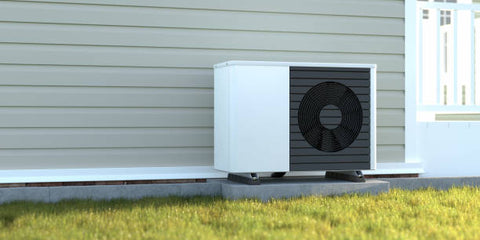Air-source heat pumps are a popular choice for maintaining indoor comfort while minimizing energy consumption. In this section, we'll take a closer look at how these remarkable systems work and the many advantages they offer to homeowners.

How Air-Source Heat Pumps Work
Air-source heat pumps operate on the principle of extracting heat from the outdoor air and transferring it indoors. These systems consist of key components, including an outdoor unit, an indoor unit, and a refrigerant. Here's a brief overview of how they function:
Absorption of Heat: The outdoor unit absorbs heat from the surrounding air, even in cold temperatures. The refrigerant then carries this heat energy.
Compression: The refrigerant is compressed to increase its temperature.
Heat Release: The now hot refrigerant releases its heat energy inside the home through the indoor unit's coils, thereby warming the indoor air.
Cycling: The refrigerant is cycled back to the outdoor unit to repeat the process continuously, maintaining the desired indoor temperature.
Advantages of Air-Source Heat Pumps
Air-source heat pumps offer several benefits that make them an attractive choice for homeowners:
Energy Efficiency: These systems are highly energy-efficient, as they don't generate heat but rather transfer it. This can result in significant energy savings compared to traditional heating methods.
Versatile: Air-source heat pumps provide both heating and cooling, offering year-round comfort in a single system.
Environmentally Friendly: They produce fewer greenhouse gas emissions, reducing their environmental impact.
Quiet Operation: Air-source heat pumps are known for their quiet and unobtrusive operation, making them suitable for residential use.
Easy Installation: Installation is generally straightforward, especially when compared to more complex geothermal systems.
Cost Savings: With their energy efficiency, homeowners can save on utility bills over time, offsetting the initial installation cost.
Factors to Consider When Choosing an Air-Source Heat Pump
Selecting the right air-source heat pump for your home involves considering several factors:
Climate: The system's efficiency can be affected by the local climate. Some models are better suited for colder regions than others.
Size: Proper sizing is essential to ensure the system effectively heats or cools your home.
Efficiency Rating: Look for models with high Seasonal Energy Efficiency Ratio (SEER) and Heating Seasonal Performance Factor (HSPF) ratings for optimal performance.
Budget: Consider your budget, including the initial installation cost and long-term savings potential.
Professional Installation: Ensure the system is installed by a qualified HVAC technician to maximize its performance and longevity.
Common Issues and Troubleshooting
While air-source heat pumps are generally reliable, they can encounter issues over time. Common problems may include reduced heating or cooling capacity, frozen coils, or unusual noises. If you experience any of these issues, it's advisable to contact a professional technician for troubleshooting and repairs.
Air-source heat pumps offer an energy-efficient and environmentally friendly solution for climate control in your home. Whether you're looking to reduce your carbon footprint, save on energy bills, or enjoy year-round comfort, these systems provide a versatile and cost-effective option.
To learn more about air-source heat pumps and explore the best models and brands on the market, contact a local HVAC expert or visit your nearest home improvement store. Making the switch to an air-source heat pump may be the key to achieving a comfortable and eco-friendly indoor environment.

